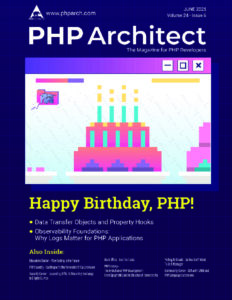Matt Lantz

Matt has been developing software for over 13 years. He started his career as a developer working for a small marketing firm, but has since worked for a few Fortune 500 companies, lead a couple teams of developers and is currently working as a Cloud Architect. He’s contributed to the open source community on projects such as Cordova and Laravel. He also made numerous packages and helped maintain a few. He’s worked with Start Ups and sub-teams of big teams within large divisions of companies. He’s a passionate developer who often fills his weekend with extra freelance projects, and code experiments.
twitter: @Mattylantz
Articles
Apache Kafka & PHP: Resilience and Scale in a Box
By Matt Lantz
If you’ve been writing PHP code in the last five to ten years, there is a high probability that, at some point, you’ve started working with queues. It could be that your team started using queues for async jobs like notifications or data relays to external tools based on user actions. Regardless of why or how you were introduced to them, queues clearly add great value to any application structure. However, if your experience with queues has mostly been limited to Redis or SQS, then you’ll be very happy to learn more about Apache Kafka. Whether it’s real-time data streaming or event-driven integration, Apache Kafka can provide enterprise-level support for any application or set of micro-services. by Matt Lantz
Published in HaPHPy Developers, August 2024
PHP & WebAssembly: An Edge Case
By Matt Lantz
As my career has progressed, I, like many readers out there, have seen the introduction of some game-changing platforms here and there. The field of web development only remains so prominent because of these various shifts in how we do things. Among the recent advancements, WebAssembly (Wasm) stands out as a game-changer, promising near-native performance for web applications.That alonedoesn’t soundlikemuchuntilyou considerthe factthat it’s a VM system running in either thebrowseror an Edge compute instance near you.So, combining it with PHP, a stalwart in server-side scripting, can unlock unprecedented efficiencies and capabilities. by Matt Lantz
Published in Search For Good Code, July 2024
MJML: Unleashing the Power of Responsive Email Templates
By Matt Lantz
Many PHP developers spend far too much time crafting responsive email templates for applications. Maybe you’re like me, and you give in and use whatever layout Laravel offers out of the box. Though this can be a quick win, it’s rarely going to satisfy a client’s custom desires. by Matt Lantz
Published in AI Llamas, June 2024
Embracing the Fibers of PHP
By Matt Lantz
PHP often gets ignored in a world of compiled binaries and serverless infrastructure running containerized applications. Those of us developing with the latest practices for the last ten-plus years know that PHP has significantly sped up and embraced many cutting-edge features. Perhaps that is why it is still the most popular web programming language. One of the major advances in more recent PHP was the introduction of Fibers. This highly anticipated feature introduced a new format for managing concurrency tasks that had not been seen before. by Matt Lantz
Published in PHP Reflections, May 2024
Go vs Rust: A Guide for PHP Developers
By Matt Lantz
Programming languages are evolving fast, and developers need to keep up with reason. I have heard about many colleagues wanting to explore new languages, and the two most popular were Rust and Golang. The two popular programming languages, Golang and Rust, have risen to prominence beyond the PHP community. These two highly sought-after languages have some comparable features and functionality. Hopefully, I can help some PHP developers make an informed choice on which language to learn next. by Matt Lantz
Published in Deep Diving PHP Security, April 2024
Navigating the Ocean of Data Visualization with Mermaid.JS
By Matt Lantz
If you’ve ever drowned in the crashing waves of code while attempting to create a flowchart, sequence diagram, or any form of data representation, then it’s time for you to be rescued by Mermaid.JS. This powerful JavaScript library for creating diagrams and flowcharts is a breath of fresh air for the developer community, offering a haven from complicated, time-consuming charting tools. by Matt Lantz
Published in World Community, March 2024
A Comparative Analysis of Swoole vs Roadrunner
By Matt Lantz
by Matt Lantz
Published in The PHP Gambit: Winning Strategies in Code, February 2024
Secret Management: And Why You’ll Regret Not Having It
By Matt Lantz
Consider the challenges that can come with having to scale your system, add on load balancers, and handle horizontal scaling. What about key rotations and vulnerability monitoring of secrets? These are just a few concerns a secret management platform can help your team handle. by Matt Lantz
Published in Bad Bug Bounties, January 2024
WebAuthn: The Future to Securing Applications
By Matt Lantz
Online security is a predominant concern among most companies and developers. Traditional authentication methods, such as passwords, have proven to be increasingly vulnerable to hacking and phishing attacks. by Matt Lantz
Published in Command Line Picasso, November 2023
HTMX: The Simple Markup Extension We’ve Been Waiting For
By Matt Lantz
Enhanced simplicity and efficiency, what’s not to love? HTMX offers both; however, it also comes with some disadvantages. Let’s review the pros and cons together and determine how to make it work best for you. by Matt Lantz
Published in Software Archeology, October 2023
Popular Tools for Robust Laravel Development
By Matt Lantz
Developers rarely build anything from scratch that isn’t neatly wrapped in various packages or frameworks. Developers also rarely configure a replica of a production environment to write some code. Developers have for decades built tools for other developers to help streamline their development process. Some communities can get this right where various members push the envelope and help remove hurdles from their fellow developers. Other communities have fallen very short. Let’s take a look at how Laravel stacks up.
by Matt Lantz
Published in The Spectrum of PHP, September 2023
Convention over Configuration: Anti-Patterns in Laravel
By Matt Lantz
There are often various threads of people ranting on Twitter and other social platforms about anti-patterns and the chaos they produce in applications. In a classic developer argument manner, their arguments are often anecdotal and rife with emotionally driven opinions over conclusive pros and cons arguments. Laravel, like any other code and framework, is filled with highly opinionated code; you buy into some of the opinions or avoid them. Laravel itself is not immune to anti-patterns, nor does it distinctively encourage developers to avoid common ones. However, there are common anti-patterns that Laravel developers can avoid while still utilizing the framework conventionally.
by Matt Lantz
Published in Packing Up PHP, August 2023
Artisan Way: MPA vs. SPA vs. Transitional
By Matt Lantz
Web Applications and website architectures have shifting trends, just
like frameworks and languages. As one group’s interest takes hold,
another group’s interest becomes the way of the past. However, the World
Wide Web’s core architecture has changed very little throughout its
life; That statement could trigger some people, so I’ll clarify it.
Since its inception, the core of the World Wide Web was simply you enter
an address in a browser, and you get content provided back. In cases
where you submitted information, the server consumed it and either
redirected you or provided direct content. Yet, regardless of this,
developers have consistently attempted to force the server-browser
relationship into some Frankenstein that either becomes a nightmare of
maintenance or becomes a pattern we all choose to leave in the past.
by Matt Lantz
Published in Be Barrier Free, July 2023
Artisan Way: Defensive Programming For Laravel
By Matt Lantz
Building Laravel applications can be a wonderful experience. As a
full-stack framework, it provides numerous avenues for creating a
well-functioning scalable application. Laravel is, by default, set with
layers for security measures, and there are multiple packages to add
extra standards, ensuring your application will remain as secure as
possible. by Matt Lantz
Published in Evolving PHP, June 2023
Artisan Way: ADR vs MVC
By Matt Lantz
In ADR or Action-Domain-Response, we maintain a three-piece pattern
that lets us split our responsibilities. The classic MVC structure or
Model-View-Controller is prevalent across all languages in the web
development industry. Let’s take a closer look at both. by Matt
Lantz
Published in HTTP Burritos, May 2023 —Available for Free
Artisan Way: The Subtle Art of Optimal DaaS
By Matt Lantz
All too often, when any Laravel developer is requested to start a
project, they get zoned in on the selection of things like Livewire
vs. Inertia or which Spatie packages to use. Generally, their focus is
on the code, not the infrastructure or the DevOps tooling. Regardless of
their stack, most developers have a cloud provider they are most
comfortable with: Digital Ocean or AWS, or one of the many others.
Second, particularly in the Laravel community, the next question is, do
I use Forge or Vapor for this project? What we’re examining is the
subtle art of DaaS selection and optimization. by Matt
Lantz
Published in Getting TEKnical, April 2023
Artisan Way: Laravel 10: New Features and Upgrade Impacts
By Matt Lantz
Upgrading a Laravel application has rarely been considered a “large process”, but a version of Laravel is released every now and then that carries with it some “bigger” changes. Laravel 10, like the last couple of versions, has been an exercise in an elegant release structure that enables developers to upgrade and deploy an app, usually in less than 10 minutes. I’ve been able to get a couple applications upgraded recently, and it took less than 5 minutes in each case. There are a few small quirks in version 10’s upgrade process, which are outlined below. However, the overall upgrade is smooth and, in this version’s case, simply adds more features and a minor reduction in dependencies. by Matt Lantz
Published in Box of PHP, March 2023
Artisan Way: Events, Listeners, Jobs, and Queues Oh my!
By Matt Lantz
Harnessing the power of Laravel’s queues, events, listeners, observers, and jobs will significantly improve response times and provide your application with a clear separation of coding concerns enabling you to deliver some seriously efficient code. by Matt Lantz
Published in Knowledge Crunching, February 2023



